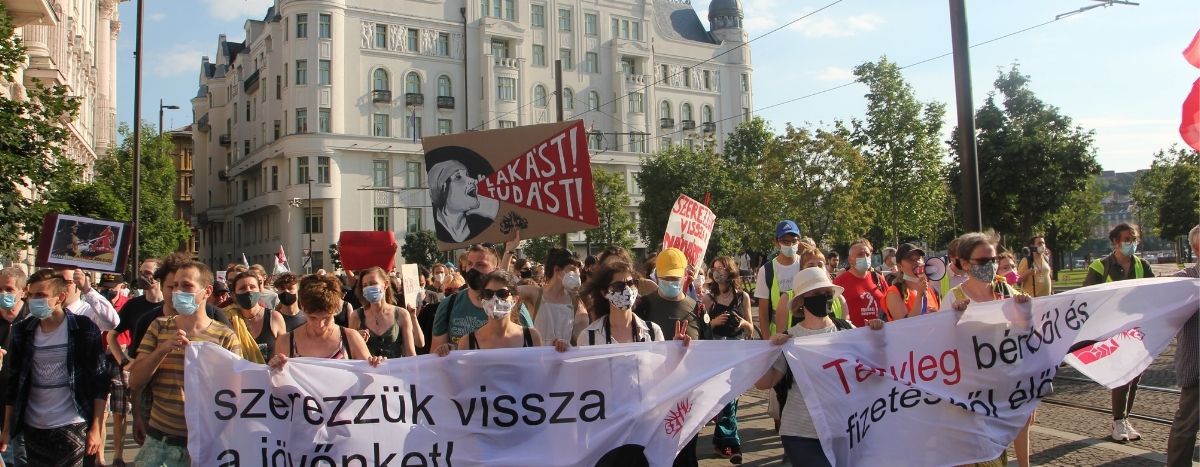
Young Hungarians are marching for their future
Published on
Translation by:
 Keith S
Keith S
Thousands of protestors marched in the streets of Budapest on Saturday 5 June to protest against a proposal to construct a large campus for the China-based Fudan University in the south of the Hungarian capital. Ten days later, young people protested against a proposed law that lumps homosexuality together with paedophilia.
"There is a real housing crisis here. We need housing, not an elitist super-campus!" Ábel, 20, like many other students, came to protest against the proposed construction of a new campus in Budapest. A Chinese university based in Shanghai, Fudan University, plans to open international facilities in Hungary by 2025.
The agreement between the Hungarian and Chinese governments was revealed at the start of the year. Due to the health crisis in Hungary, however, no protests took place. Taking advantage of the end of lockdowns, the opposition has quickly taken to the streets to protest against what it calls the "Fudan affair." Contrary to the government's hope to bring an elite university to Hungary (Fudan is one of the world's top 50), students do not seem too enthusiastic about the news.
"I don't know of a single student who is happy about this. With young Hungarians unable to afford university as a result of house and rent prices, let alone the tuition costs at Fudan... this is in no one's best interest," says Zsofi, 18. If the protestors are particularly emphatic about the housing problem, this is because the mega-campus will replace a previous, long-standing proposal: the construction of a true "student village" in the south of Budapest. Instead of an affordable residence, with thousands of anticipated spaces, there will be just a handful under the current plans, as the Fudan campus will take up the area that was initially dedicated to the housing project.
Not just students
"Obviously I've come to protest against the university project!" explains retiree Édith, in the square in front of the impressive Hungarian parliament building. "The country will go so much into debt that even my grandchildren will have to pay it back right up until the end of their lives," she says.
What is she referring to? The answer concerns the contract to construct the university, the terms of which have recently been revealed. The development will be financed by a loan of around 500 billion forints (around 1.4 billion euros) from China. Hungary will pay 100 billion forints upfront to start the project. Later, the Central Bank of China will pay around 450 billion in either yuan or euros: the details are still being worked out. It will take the form of a loan spanning 10 or 15 years, that Hungary will be responsible for paying back in full.
"That's it, China has bought the country; they will do whatever they want," warns László, 53. He emphasizes the danger posed by building the Chinese university. "The Chinese government is very aggressive and actively spies on every country around the world. This university will be one of their secret bases." Housing crisis; increase in debt; Chinese espionage; there are plenty of factors causing people to mobilize against the project.
The opposition, which notably controls Budapest city hall, has realized this and has made Fudan its main weapon against the ruling parties. Before the protests, the opposition had already caused a controversy by renaming streets in front of the site soon to welcome the Fudan campus "Dalai Lama Way", "Uyghur Martyrs Street", or even a "Free Hong Kong" street, all of which will no doubt upset Beijing. Now, they are promising that they will not allow Fudan to be built without a referendum.
The government pushes back
Despite the fact that the lockdowns had barely been lifted, the protest on 5 June saw around 10,000 participants. It was, for this reason, a warning signal to the government. While the mood was sombre - with few chants or slogans - Orbán's opponents sent a loud message.
The Prime Minister did not take long to push back. Sensing that Fudan could be a decisive issue going into the 2022 parliamentary elections, Orbán’s group, Fidesz, decided to lash out against the opposition as a whole. This marks the first time since 2010 that all parties - excluding the majority - have decided to unite with the sole goal of removing Fidesz from power. Even historic rivals have come together. Notably, various left-wing parties have united with Jobbik, an old far-right party which has now redefined itself ideologically.
The ban on "promoting" LGBTQ+ issues
For several weeks, the Hungarian parliament has been looking into a proposal to increase punishment for crimes of a paedophilic nature; something which is acceptable a priori to all the political parties. At the last minute, however, Fidesz added new clauses to the legislation: "promoting homosexuality" and "sex change" to minors, or simply "making [them] accessible", will be banned. Raising questions about homosexuality or transgenderism to school students will also be forbidden. Only state-approved organizations will have the right to educate regarding subjects like sexuality, drug use, and the internet.
These amendments were revealed on 11 June. Within several days, two non-governmental organizations - Pride and Amnesty International - succeeded in organizing a protest at the parliament building the following Monday evening. Taking advantage of the summer vacation, several thousand people, led by high school and college students, responded to the call and gathered to voice their rejection of Fidesz and homophobia in a much noisier spirit than those who had attended the anti-Fudan demonstration.
Two days later, on 16 June, hundreds of young people gathered at the presidential palace to demand that President János Áder refuse to sign the bill into law. Organizers asked protestors to write letters to the president in their capacity as young LGBTQ+ people. In particular, participants were invited to point out the positive role that schools and their communities (teachers, psychologists, guest speakers), could play in their process of "coming out" and their gradual discovery of their gender identity.

No success. The government mostly succeeded in its political stunt. For the first time, they broke up the opposition front. Despite its redefinition, Jobbik embraced its traditional "Christian" and "conservative" roots and voted in favour of the bill, believing it to promote education conforming to "Christian values." While they have promised to dismantle the bill once in power, the vote revealed the fragility of the anti-Fidesz front, and how threatened it is by deep ideological differences.
Beyond the electoral sphere, however, a part of the Hungarian population is once again mobilising. In Viktor Orbán's Hungary, young people have taken to the streets several times: against the exclusion of the country from the Central European University, against the restructuring of the University of Theatre and Film Arts in Budapest, against a "pro-slavery" law, to name just a few occasions. Every time, however, Fidesz and its seemingly absolute majority ends up victorious.
This Monday, 14 June, as the sun sets in the sky, the organizers of the LGBTQ+ demonstration finish by telling protestors to disperse, though not before chanting together "Itt vagyunk!" ("We are here!"). Fortunately, history has shown that the hope, energy, and enthusiasm of young people will never die.
Cover image: ©Thomas Lafitte
Translated from La jeunesse hongroise dans la rue pour ses droits et son avenir


